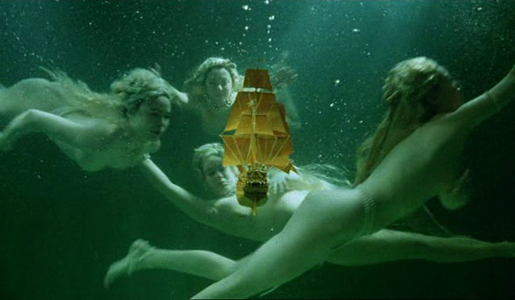Having resolved this year, the 400th anniversary of Shakespeare’s death, to experience in any way, shape, or form the bard’s entire oeuvre, my first was Shakespeare’s reputed last, “The Tempest.” Poet W.H. Auden thought “The Tempest” offered Shakespeare’s most sublime story-telling. Novelist Henry James claimed it contained the Bard’s purest poetry. I love the play for its vivid characters — innocent Miranda, ignoble savage Caliban, ephemeral Ariel, but especially Prospero, the cantankerous wizard, who looks back to Marlowe’s Doctor Faustus (and further back to medieval Merlin). Prospero is also, of course, a stand-in for the playwright himself and so for all writers. Jorge Luis Borges (another literary magician) describes Shakespeare as both “everything and nothing.” Shakespeare was “nothing” because nearly anonymous, his identity forever contested, he disappears into his work. “These our actors,/ As I foretold you, were all spirits, and/Are melted into air, into thin air:” Shakespeare was “everything“ because his work, his words describe better than any ever the entire world. And more than any other of his works, Shakespeare appears in “The Tempest” where he painted a portrait of the artist in Prospero. “Now I want/ Spirits to enforce, art to enchant…”
My first “Tempest” of 2016 was a DePaul University student musical puppet-adaptation called “Prospero’s Storm.” Recommended for ages 8 and up, it features a talented cast that will surely be seen again soon.My favorite stage production of “The Tempest” was the magician Teller’s at Chicago Shakespeare last fall. Teller made Prospero’s magic “real” (http://somestrangeness.com/2015/10/01/tellers-tempest/ ). My touchstone, however, is Peter Greenaway’s 1991 film “Prospero’s Books” (https://www.youtube.com/watch?v=46SmncwWVM0 ), wherein Sir John Geilgud speaks every role — from the opening “Boatswain!” to his departing refiguring of the Lord’s Prayer “As you from crimes would pardon’d be,/ Let your indulgence set me free.” — Mark Rylance plays Prince Ferdinand and puckish punk modern dancer Michael Clark performs Caliban. I’ve seen this film more than a dozen times, but even as I write this I suddenly have the urge to see it again. It is so spectacular, so full of detail that it has never failed to fascinate and inspire me.
What am I trying to get from this year of Shakespeare? Even more than tragedy or comedy or even awesome spectacle, I want to engage with Shakespeare’s words. He has given us more of the language we all use than any other author. If critic Harold Bloom overstates the case when he argues that Shakespeare “invented the human” with his monologues, teaching us how to talk to ourselves, I can forgive his hyperbole. The words we use to talk to ourselves, the words we think with, are not our own. They’re not ours originally or inherently, we’ve inherited them. And we English-speakers inherited much of our language from Shakespeare. “You taught me your language and my profit is that I know how to curse.” Pace Caliban, I also know how to bless, how to praise and to blame, how to love, and how to dream. “O brave new world!”
